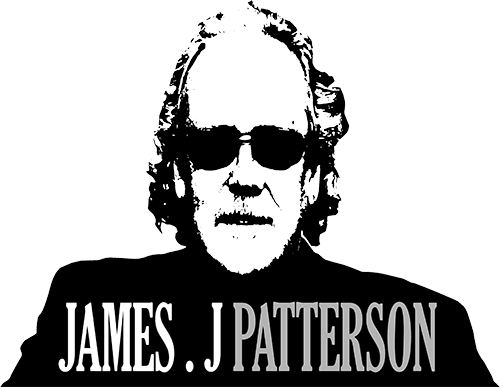In a previous harangue among our beloved Vagabonds I floated the idea that America should pass a law stating that jobs should not be exported to countries that do not allow Collective Bargaining. I would now like to invite those economic wizards smarter than I am to share their thoughts on such a proposition. Simply hit the comments button below, and let’er rip!
James J. Patterson
-
-
“I don’t believe there’s a great salvation in (our) political process at all. I believe in far different things. I mean, I put Democracy far down the line. I think a devoutly Christian, Conservative, Traditionalist country, even if it’s a Monarchy, is fine with me.” Pat Buchanan on Hardball with Chris Mathews 6-18-09
…And No Friend To Freedom
At last a Republican spokesperson has come right out and said it. Listen to him here. They don’t like democracy.
Mathews: “You are not what you call derisively, a ‘democratist.’” To which PB gave the above answer.
Now here’s what I think. It’s time for the media to poll elected Republicans and ask them flat out, yes or no, is our democracy something you support? Is our constitution something you can pledge allegiance to? That is something voters have a right to know. This is a man, after all, who ran for President of the United States several times. Would he have refused to take an oath to preserve our constitution?
As I said in a previous harangue, people the world over love their homeland wherever they come from. The difference is that America is supposed to stand for an ideal that was spawned in The Enlightenment period of Western Civilization. I have never met a Republican who understands or appreciates the difference. The current Republican culture has betrayed their disdain for free speech, voting rights, democracy, other cultures, or anything outside of their narrow bourgeois sensibilities. Their ghastly and despicable campaign in 2008 offers plenty of evidence to that.
Democrats and independents must really take heed and understand this: Republicans hate you. They hate you with the same vitriolic loathing that most people reserve for child molesters (I’m not kidding, didn’t McCain attempt to brand Obama as wanting to teach sex to kindergartners? The right wing floated ads in Minnesota branding Al Frankin as a pornographer. Why? Because they know that their base will believe it.) Republicans sneer at your Idealism and consider anyone who isn’t cynical and treacherous in the name of personal greed and advancement as unrealistic. Democrats simply don’t carry the same bilious hatred in their souls for anyone the way Republicans hate them. Most Dems refuse to believe that it’s true, but it is. When John McCain snapped at Tom Brokaw during a debate during the 2008 presidential election that he wouldn’t appoint Brokaw Secretary of the Treasury, it wasn’t merely a “towel snapping moment” as one pundit quipped, what he meant was, he wouldn’t trust the economy with a filthy liberal like Brokaw. The same contempt was seen in another debate when he couldn’t even bring himself to look at Obama, or when he referred to Obama as “that one.” It was sheer hatred, pure and simple, naked and ugly. Liberals are just too nice to see it for what it really is. And now, after purging their party of all moderates, only the truly hateful Republicans remain. Frustrated by the failure of their ideology and the unmasking of their true motivations for endorsing that ersatz ideology, they are spilling out of the woodworks of our culture with their true beliefs, and it isn’t pretty.
So, the question remains for all Republicans, “Do you agree with Pat Buchanan, that a Theocratic Christian Monarchy would be better for America than the Secular Democracy that has been handed down from the Founding Fathers and articulated in our Constituion?”
Yes, or no.
More Later…
JJP
-
Mark Zaid was given a traffic ticket in Montgomery County, MD, recently for flashing his headlights back in thanks to a driver who warned him about a speed trap. He was fined fifty bucks. He took it to court and won when the officer failed to appear.
Mr. Zaid’s Remarkable Heroism Is Chronicled Here.
Let’s face it, if a person sees a speed trap and flashes their lights to warn you and you both slow down, the law is served and public safety wins. Sometimes motorists need a gentle reminder why speed limits are posted in certain hazardous areas, whether it’s a deceptively dangerous curve or a neighborhood or business has demanded enforcement. If, however, the local police are NOT motivated by public safety concerns but are, on the other hand, using law enforcement as a mere revenue enhancement tool, then we have a problem with the cops and local government because you cannot have a constabulary whose primary relationship with the public is predatory. Ask yourself, why would there be any reasonable ban on driving with your hazard lights flashing, flashing your high beams, or any other means of communicating with other driver’s on the road except to give the police a reason to pick your pocket, search your car, or perhaps even harass you for being a political gadfly? Also, the flashing of lights has a multiple of necessary reasons for being used, i.e., warning a driver to turn on their headlights, telling a slow driver to get over that you want to pass, or simply to get someone’s attention, one can only conclude a sinister reason for such a measure. SO Cheers for Mr. Zaid, for fighting back for all of us. The next step should be to come up with a warming system to the public when idiotic and repressive measures such as these are being proposed in the first place and a civic organization to respond to local governments w fire and brimstone when they are. To such an organization I would contribute generously.
And baby! I want to be there when Mr. Zaid gets one of those letters from the fookin’ freakin’ Montgomery County Safe Speed Photo Radar Program!
More later…
JJP
-
Anyone who owned a home during the last ten years remembers one thing very well: The avalanche of junk mail assaulting us with spectacular offers to take advantage of rising home equity. If nothing else, these crooks should be contributing cash to support landfills and recycling systems, not to mention planting a few billion trees!
From The Downturn, Looking Up!
In the 1920’s during the boom leading to the bust that became The Great Depression, the Secretary of the Treasury was a 75-year-old financier named Andrew Mellon. Mellon believed in the edicts of Calvin Coolidge, that “the business of America is business” and also believed, as did Coolidge and his successor knucklehead Herbert Hoover, that the government’s only justification for existence was to serve big business. So naturally when Mellon got his hands on the Treasury, and believing, as Reagan and Bush II many decades later, that taxes on the high-income brackets was bad for (their) businesses, Secretary Mellon, who couldn’t change tax law all by himself, simply refunded wealthy people their tax money. In his first eight years at Treasury, he refunded $3.5 billion. Millions went to companies he owned, and the rest to other wealthy Republicans. He was especially generous to those contributing $10,000 each (in Depression Era dollars!) to Republican candidates.
I was thinking of old Andrew Mellon the other day as I read a front-page New York Times piece declaring that ten big bank holding companies, among them American Express, Goldman Sachs, JPMorgan Chase, Morgan Stanley, and yes, Bank of New York Mellon, have returned a combined $68.3 billion of the government’s bailout. “That represents more than a quarter of the federal bailout money that the nation’s banks have received since last October”, said the Times. The Times went on to lament that “After banks return the TARP money, the administration will forfeit much of its leverage over them. With that loss goes a rare opportunity to overhaul the industry.”The bankers, of course, are running from the strings attached regulations that came with the TARP bailout, chief among them the limits on executive compensation for their top 25 compensated workers. (Sounds like 250 really pissed off millionaires to me! MSNBC should profile ten a day, put their pictures and names up where we can see them so that these assholes become household names.) The article pointed out that although taxpayers actually profit from the return in the form of up to a few billions of dollars in interest and earnings on the money, we, of course, lose, because:
a) The banks were supposed to use the money to make LOANS to keep the economy afloat not just cover their gambling debts, and
b) Giving back the money before the economy has stabilized may mean they could end up right back at the government’s back door with their hands out and pockets empty. What then?Some Food For Thought:
Sink the TARP Return Into Public Transportation!
1. Since the TARP program began in the final days of the Bush II Administration, is it safe to conclude that bankers simply scammed an outgoing administration full of gullible free-market Liberty College grads? JP Morgan says, “Our Company did not need the capital.” They needed it alright, but since they only care about getting and staying wealthy, the ten biggies traded the TARP money back and forth among themselves – instead of loaning it to American businesses – to make their balance sheets soar in order to justify another, perhaps one last, round of bonus payouts. These people are criminals, thieves, and liars. I look forward to their trials being covered every day, gavel to gavel on CNN, O.J. Style, for the next couple of years. BTW How about putting that $70 billion (68 plus interest) of returned TARP $ into public transportation? I have a feeling we’re going to need it!
What’s Good For America (should be) Good For GM!
2. While we’re on the economy, why, I wonder, is there all this prudish, puritanical hand-wringing about bailing out our auto industries? Personally, I think there ought to be a government supported loan program for what one might call, “vital industries.” Lots of other countries do it as a common sense measure to keep their economies strong and growing rather than allowing vital industries to calcify and become stagnant. My only gripe is that the government should have stepped in years ago, perhaps as far back as the late 1970’s, when GM’s answer to the small car boom after the first OPEC embargo was to roll out the biggest gas-guzzlers they had ever made! The Germans and Japanese have been trying to teach GM, Ford, and Chrysler how to sell cars to Americans for decades. The American Auto Industry bitched and moaned all through the 1970s and ’80s, as they forfeited market share to foreign competition rather than retool, that The Marshall Plan after WWII bought these competing countries all new factories thus giving them an unfair advantage. Jesse Jackson answered the challenge by suggesting we needed a New Marshall Plan for American business and labor here at home. Too bad nobody listened. BTW, remember when GM’s chairman said, “What’s good for GM is good for America?” Well, it’s about time someone shouted back, “What’s good for America ought to be good for GM!”
Let’s Put A Rush Order In For Alternative Industries!
3. The tragic loss of jobs in so many sectors is horrific for sure. But on the other hand, there’s nothing Corporate America loves more than firing Americans from their jobs. Elsewhere on this site, I’m calling for economists to weigh-in on the idea that we should simply stop exporting jobs to countries that do not allow unions or collective bargaining. What do you think? The current worry about this nascent recovery we’re in is that it’s not creating new jobs. Perhaps it’s time for Obama to hit the accelerator on his Alt Industries for Tomorrow program today!
It’s All Reagan’s Fault!
4. What we actually have here is Reagan’s Service Economy finally imploding. And good riddance! Are we really going to miss the corporate chains that have disappeared? Can you name more than three? The fact of the matter is that every one of those big corporate chains (Circuit City, Borders, Linens-N-Things, Rite Aid, Foot Locker, etc.) originally put out of business thousands upon thousands of genuine entrepreneurial businesses that used to serve their communities’ needs very well, many of which had been in place for generations. Everything from local bookstores to electronics shops, to clothing, household goods, pharmacies, shoe stores, restaurants, coffee shops, and grocery stores have all been ploughed under by American Corporate giantism. Maybe once the corporate economy collapses we can have our community shops and the services they rendered locally, back. And while we’re at it, how about bringing back neighborhood bars too!
5. Question: Should AIG be broken up into a thousand pieces?
6. And WTF is a financial warrant? I know, I know, it’s like a futures in stocks instead of soy beans, and as bad and ruinous an idea as a carbon credit (don’t get me started) and just another bit of hocus pocus from your unfriendly neighborhood Kakistocracy!
More later…
JJP
-
“You were positively loathsome,” theatre-goers said as they shook James J Patterson’s hand while exiting the Al Lefcowitz Theatre at The Writer’s Center, in Bethesda, Md, after viewing a staged reading of the new play Anna Nicole, by Grace Cavalieri.
See a brief review and pictures here!
I was able to deflect attention away from my horrid character, the wicked agent Horshel in Anna Nicole, by pointing out what a spectacular Anna Rose Solari made. The hundred plus patrons in attendance were treated to a sympathetic reinterpretation of the personae of Cavalieri’s Anna, who, according to her tutor, Pushkin, played by Jim Gagne, was “damaged by gender,” and puts “deprivation on trial.”

- Rose as Anna by Bill Lawrence
But it was Rose Solari’s depiction of the muddled, confused “sweet kid,” Anna Nicole Smith that sent patrons away disbelieving what they had seen. The inhuman image of American-style sex-image marketing rendered human, and worthy of consideration.
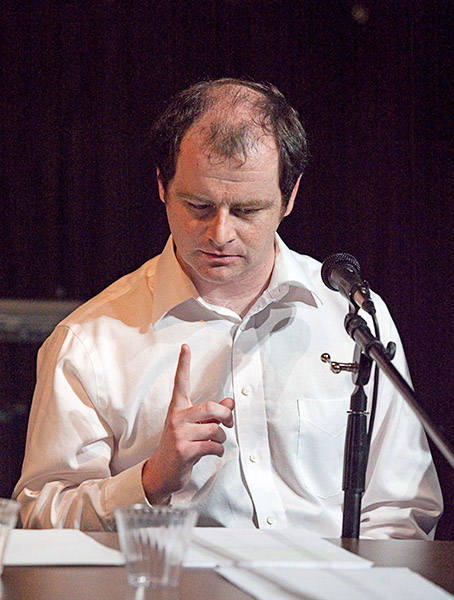
- Jim Gagne as Pushkin by Bill Lawrence
In Cavalieri’s version of events, all those in Anna’s immediate orbit claim jurisdiction over the sexpot Anna. Her agent, Horshel, the crudest of all, attempts to market a product called “Pop Porn” for viewers to munch while they watch her sex videos. Her tutor attempts to claim intellectual jurisdiction insisting that “God will tell me what you should know, then I’ll tell you,” and coldly brushes off Anna’s advances insisting, “I’m an intellectual, I get one erection a year.” Meanwhile, even her phantom dead twin sister “Anima,” played with a dreamy wickedness by Ellen Cole, hovers nearby when Anna is afraid, taunts her, mocks her, and enjoys her suffering. The one sympathetic person in her life, a kindly interviewer who attempts to see the human side of the model wanting to publish only pictures of her beautiful face, played by Ken Flynn, is elbowed aside rudely by her needy exploiters.
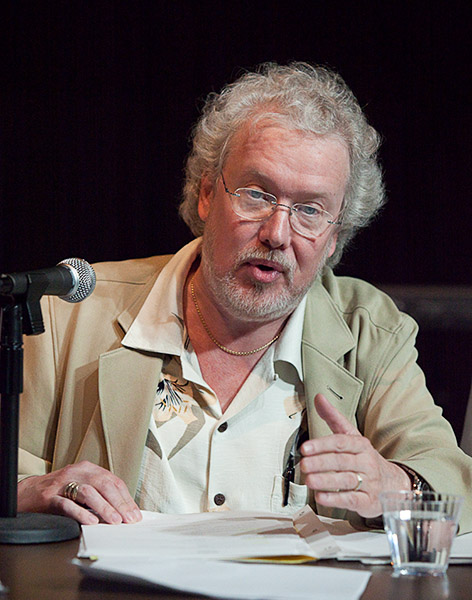
- Patterson as Horshel by Bill Lawrence
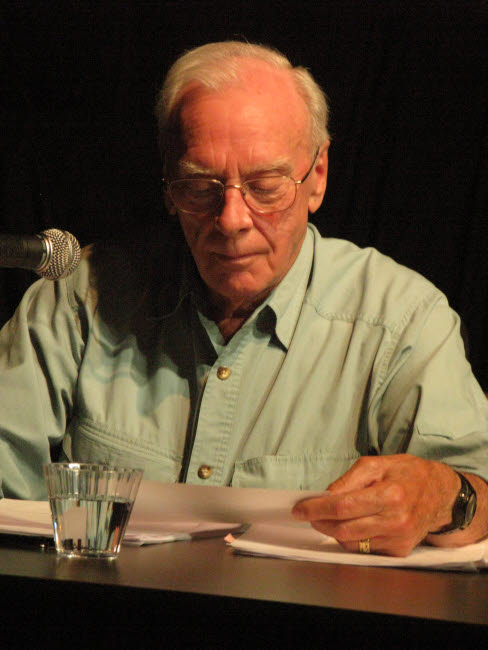
Ken Flynn by Dan Murano

Ellen Cole as Anima by Dan Murano
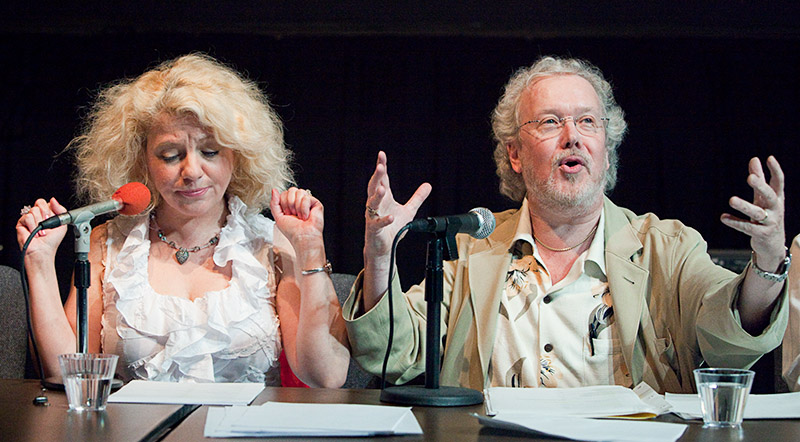
Anna/Rose & Horshel/Patterson by Bill Lawrence

Ken Flynn, Ellen Cole, Rose Solari, James Patterson, Jim Gagne, Grace Cavalieri by Bill Lawrence

Playwright Grace Cavalieri by Dan Murano
“The audience loved it. We loved it. I want to see it again!” – Judith Farr

The Writer’s Center Crowd by Dan Murano
“JP made me hate him, so he did his job.” – Betty Tate
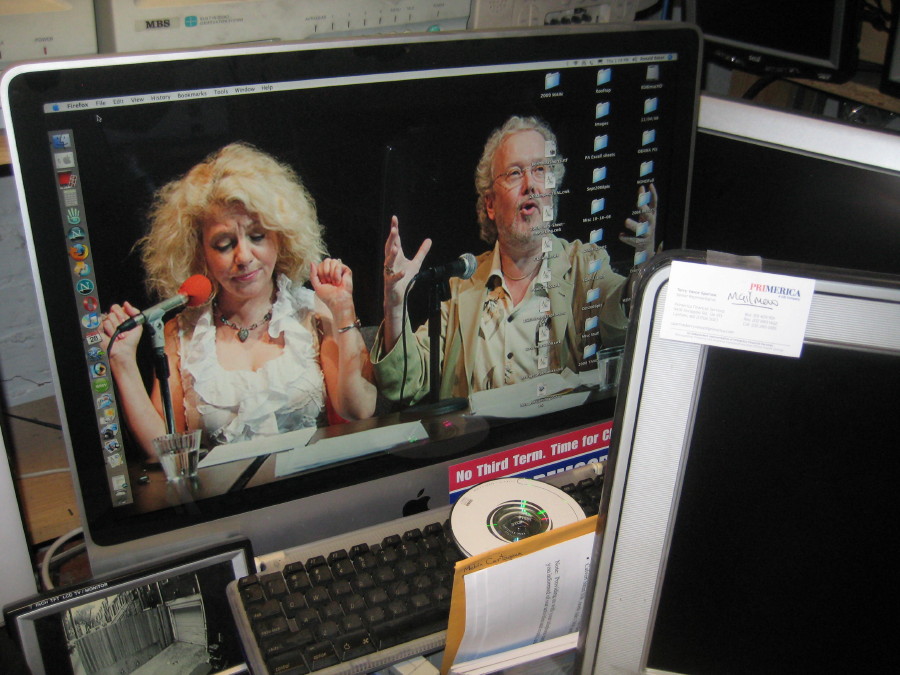
- From Real Life to Baker’s Desktop?
More later…
-
Every spring, Oxford University puts on a literary festival like no other, and the legendary Blackwell’s Book Shop, lead by the incomparable Rita Ricketts, sponsors a Fringe Festival to coincide with it. This year, James J Patterson read from his forthcoming book of essays and fiction, Bermuda Shorts, a little story called, “Something Out of Nothing.”
James J Patterson and Rose Solari at the Oxford Fringe Festival!
American Poet Rose Solari was the “Poet in Residence” at the 2009 Oxford Fringe, and James J Patterson tagged along.
Over the course of the week-long festival, Solari read from her book Orpheus In The Park, as well as new material read here for the first time in public. Fans of Ms Solari were treated to “Elegy For The Virgin,” “Somewhere Between 4 and 5 AM,” “Letter To My Father,” “Orpheus In The Park,” “Tree House For The Dream Child,” “To The Wine Taster,” “My Mother’s Piano,” “Elegy For My Twenties,” “Achilles On Shore,” “Making,” and “Poem For Grace.”
Aside from Solari & Patterson, the Fringe Festival was host to some very accomplished and outstanding talent this year. If you’re looking to branch out with your summer reading, check out the Poets Jamie McKendrick, author of Crocodiles & Obelisks and Jane Griffiths, whose latest is called Another Country. McKendrick’s rumpled, soft-spoken intellectualism, and Griffith’s lanky flamboyance, were a delightful contrast with Solari’s hint of American glamor and cross-thatched mythological musings. Rose Solari’s review of McKendrick and Griffith’s new books and more can be found in the current issue, no. 104, of Poet Lore, America’s longest continuously published Poetry anthology, (dating back to 1889).
Grevel Lindop (what a fabulous name!) is a tall Ray Bolger type who writes quirky poetry that is as amusing as it is thought-provoking. He is an unlikely salsa dancer as well, go figure! His current book of poetry is called Playing With Fire. His self-described “Labor of Love,” has been to update Robert Graves’ classic, The White Goddess. This definitive work explores the stories behind the earliest European deities and is a must have. Thank you Mr. Lindop for breathing new life into a classic work! His intriguing list of titles can be found here.
Other writers worth sampling are, Simonetta Aguello Hornby (this year’s prose writer in residence at The Fringe), Jane Draycott, Claire Morgan, and photographer, publisher, Chris Andrews.
A special thanks to writer Mark Pritchard for taking time to educate yours truly in the fineties of Oxford’s pub culture! Would that I could replicate what I called the Bridge of Sighs Pub, or The Turf Pub, as it’s actually named, down the street from where I live! The Bear was another favorite, for sure. The Bear accommodates only about fifteen people comfortably but has a sweet outdoor area for many more. The local habit of popping in for a pint, getting caught up on news and chit chat before continuing on with your day, is a lifestyle that suits me to a T! I felt right at home. Pritchard, far and away the best Pub Crawl leader you can imagine, had a bone to pick with my own self when we met. He had been to JamesJPatterson.com and found my birthday tribute to Thomas Paine, where I quote Paine excoriating the British for their sins against the Colonies. “Not really very good form to put that on your website just before visiting England, hmm?” Ouch! (I was actually attempting to compare the sins of George II to another George named Bush – clearly, it needs work!)
Also, I would be remiss if I didn’t thank Monica Payne, a local Oxford barrister, for steering me away from using the term “Fannies,” in my short story, “Something Out of Nothing.” The word Fanny, in England, apparently means something quite different from derriere. A gross embarrassment was thus avoided. Thanks, kiddo!
Willy De Leeuw’s exposition on the 8 steps to appreciating Belgian Ales will await further missives to be rendered properly.
Meanwhile, at the Lit Festival itself, there was a compelling discussion hosted by the organization which awards The Orwell Prize. Marking the 60th anniversary of the publication of George Orwell’s 1984, the panel took for its title, “1984 and the debate over Civil Liberties.” Jean Seaton, the Director of the Orwell Prize, hosted the panel. Nick Cohen, a pugnacious political writer, contrarian, and stout defender of the left, and Shami Chakrabarti, Director of Liberty, tackled the current right wing gambit going on in England to scrap the Human Rights Act, adopted by most post WWII nations after the war, and replace it with a nationalistic piece of police state legislation called, “The British Bill of Rights and Responsibilities Act.”
The panel then proceeded, in a more general way, to address the state of freedom in contemporary society through an Orwellian lens. Does a society of laws favor freedom? Not necessarily. Has the movement toward Political Correctness, made us more free? Not if it codifies the repressive idea that we ought to have the “freedom to not be offended.” What are the biggest obstacles to freedom in Britain? The judiciary, and its libel law decisions, and religious militancy. Chakrabarti: “Autocracy is progressing around the world.”
Cohen: “We have lived through an extraordinarily naive time. People will trade freedom for order. Legal instruments, by themselves, do not change behavior.”It was an eye-opening debate and had the 300 or so who packed the audience on the edge of their seats.
The other event at the Oxford Literary Festival, which caught our eye, and was for me the very hi-lite of the trip, was a talk given by legendary publisher John Calder. Calder started a small avant-garde press in the 1950’s and is notable for first publishing Henry Miller in England, and his lifelong friend Samuel Beckett. “I was educated in Zurich and had a gift for learning languages. When I returned to England I was amazed to learn that of the big publishers, no one spoke any foreign languages, so it was a simple matter for me to identify who was up and coming on the continent and bring out their work here…†And Miller? “I took a chance on Henry Miller, and I was ready for a court battle. Everyone expected the Tropic of Cancer to be banned as soon as it was published, as it had been elsewhere. People lined up around the block to get their copy before the government banned it. I sold 140,000 copies in three weeks!” … “The 1950’s were an exciting time in the world of ideas,” he continued.”You have to remember that the novel was changing, the landscape was transformed from the outside world to that inside the mind. “When I asked him if he thought today an exciting time in the world of ideas, he said “most definitely yes, with new technologies, and the world coming together intellectually, we could be on the brink of something truly special. But,” he added sadly,”having just turned eighty, and my health not what it once was, I find it disappointing that I won’t be here to be a part of it for much longer.” A week later Rose and I took a detour through London, on our way to the airport, to find the John Calder Book Shop, where the old man is famous for seeing visitors and well-wishers from an office in the basement, but alas, the store was closed for the day.
Sigh.
More later…
JJP
